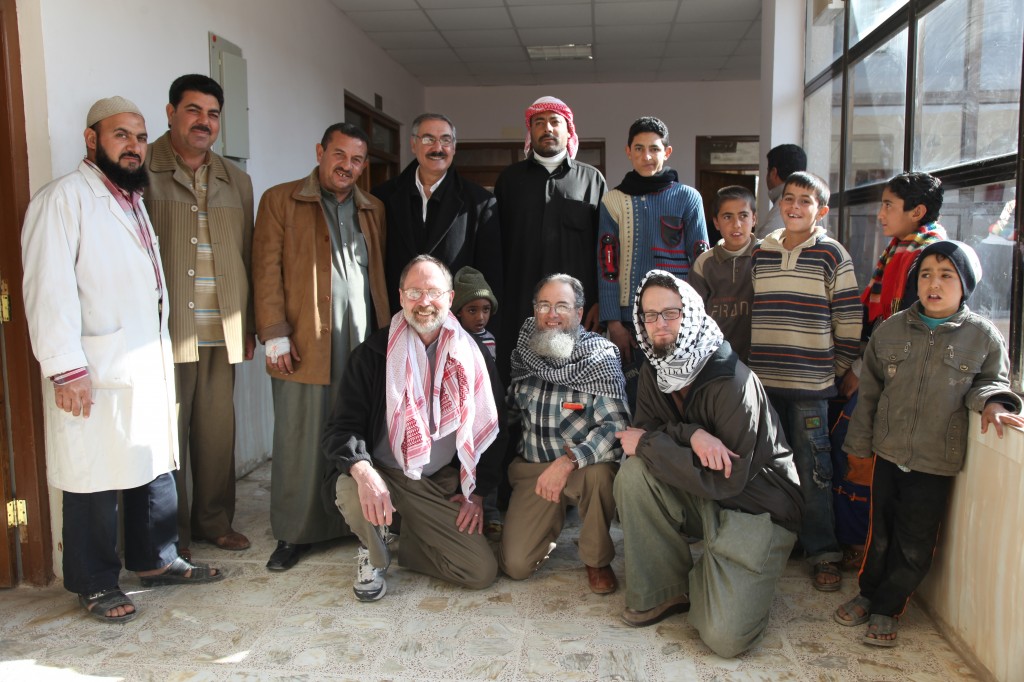
At the rebuilt Rutba General Hospital in January, 2010. Back row, left to right, nurse Tarik Ali Marzouq and physician’s assistant Jassim Muhammad Jamil, Rutba local, Muslim Peacemaker Teams founder Sami Rasouli, and the rest are Rutba locals. Front row, kneeling left to right, Rev. Weldon Nisly, Cliff Kindy, and Shane Claiborne.
The synopsis below was published by The Albany Times-Union in advance of an event where I’m speaking on Saturday, March 16. The event, hosted by the Capital Region Theological Center, is titled, “Finding Your Calcutta: Where Does God Call You.” You can register and/or read more about it HERE.
—
On a sunny Saturday 10 years ago this month three Christian peacemakers from the United States were injured in a car accident that ended violently in a remote desert ditch of war-torn Iraq. It was March 29, 2003, nine days into the Pentagon’s “Shock and Awe” campaign. The U.S. Air Force was dropping on average 941 bombs per day on a sovereign Islamic nation, according to data I gleaned from an April 30, 2003, military report titled, “Operation Iraqi Freedom: By the Numbers.” Those numbers don’t even include ordnance fired by ground troops or allied air forces.
The Christian peacemakers squeezed into a taxi that morning had chosen to reside in this bombardment with the war’s most obvious victims— everyday Iraqis caught in the cross fire between a dictator and history’s most powerful military. Some labeled the peacemakers “human shields.” Others wrote them off as suicidal. They were neither. Simply, their profound spirituality would not allow them to sit idly while their government killed innocent people. In the purest (read: apolitical) sense of the word, they were diplomats. For Christ.
Before going to Baghdad in March 2003, Philadelphia peacemaker Shane Claiborne had explained his motivation in a letter penned like a last testament. In part, he wrote:
“I am going to Iraq to stop terrorism. There are Muslim and Christian extremists who kill in the name of their gods. Their leaders are millionaires who live in comfort while their citizens die neglected in the streets. I believe in another kingdom that belongs to the poor and to the peacemakers. I believe in a safe world, and I know this world will never be safe as long as the masses live in poverty so that a handful of people can live as they wish. … May we stand by those who face the impending wrath of empire and whisper, ‘God loves you, I love you, and if my country bombs your country, I will be right here with you.'”
Weeks later, the Americans found themselves stranded and bloodied in a highway ditch. Indiana organic farmer Cliff Kindy’s scalp was split open and gushing blood. Mennonite minister Weldon Nisly from Seattle had a fractured sternum, shoulder, ribs and thumb. Claiborne, with a separated shoulder, was the least injured. But he felt sick with dread. In the Pentagon’s War on Terror, he feared that Iraqis would see the Americans as the terrorists.
When three Iraqi men in the first vehicle that came to the scene helped the Americans into their truck, Claiborne couldn’t decide if he was being rescued or kidnapped.
A half-dozen miles southeast of that hard ditch, 270 miles west of Baghdad, is a desert town named Rutba. It was the westernmost outpost for Saddam’s Ba’athist regime. Three days earlier, on March 26, 2003, a Special Forces unit from Fort Campbell, Ky., had bombed a suspected ammo depot adjacent to the region’s only hospital. Rutba General Hospital had burned to the ground. So the Americans were taken to a squat building with no electricity and no running water. It’s where Rutba General Director Dr. Farouq Al-Dulaimi, physician assistant Jassim Muhammad Jamil and nurse Tarik Ali Marzouq were treating Rutba’s sick and wounded, and where they would patch up the Americans.
Hearing that the Americans were similar to the Rutba townspeople —peaceful and unarmed — Dr. Farouq told Claiborne, “You are safe in Rutba. We will take care of you. We take care of everyone — Christian, Muslim, Iraqi, American. We are all human beings. We are all sisters and brothers.”
Seven years later, when the peacemakers returned to Rutba to find the Good Samaritans and medical staff who had saved them, Jassim told them that when he heard they had returned, he thought they had left something and wanted to reclaim it.
“I never thought that you came back to say thank you,” he said. “Is it possible that you came back for a simple service [we] provided?”
He later remarked at how the American Christians were behaving like good Muslims, only without the daily prayers.
When the peacemakers left Rutba and the reunion in 2010, they promised to keep telling the story of Rutba’s Good Samaritans. Hearing this, Tarik and Jassim offered to also do their part to bring peace and reconciliation.
“As you do when you go back and you tell your people about Rutba,” Tarik said, “we also are committed to tell our people about your visit and your noble mission.”
—
Greg Barrett traveled to Iraq in 2003 as a correspondent for Gannett News Service and is the author of “The Gospel of Rutba: War, Peace, and the Good Samaritan Story in Iraq.” He is speaking Saturday, March 16, at the Capital Region Theological Center’s event, “Finding Your Calcutta” at Lisha’s Kill Reformed Church, 2131 Central Ave., Schenectady. For more information go to http://www.capitalrtc.org.




